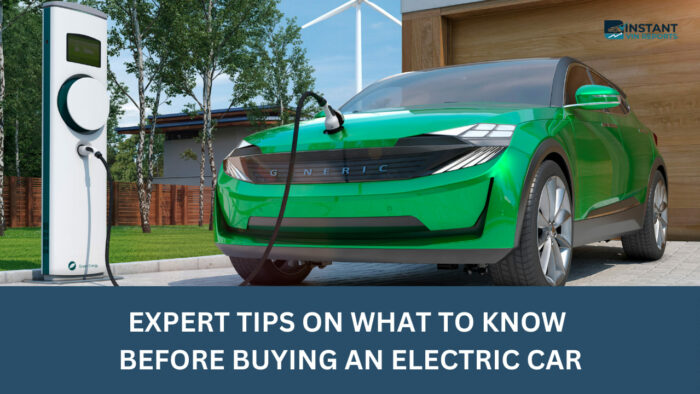Are you in need of tips for buying electric cars? Do you need an electric car buying guide? Electric cars are becoming extremely popular around the world today because of the effect of fossil fuels on the environment. With electric cars, we can reduce our carbon footprint and curb climate change. However, electric cars were really expensive in the past, but modern advances have made them significantly cheaper and more affordable. In 2022, electric car sales, worldwide, increased by 60% and approximately 10 million electric cars were sold.
If you are thinking of purchasing an electric vehicle, you may be needing an electric car buying guide, as there are some things you should keep in mind while shopping to ensure that you purchase the right vehicle that meets your needs and budget. In this article, we will explore what to know before buying an electric car so that you can make the best decision.
The ultimate electric car buying guide
Before committing to a new or used electric car purchase, be sure you are aware of the factors to look out for. Keeping an eye on these factors will assist you in making the best decisions and purchases. These factors are:
- Range and charging time
- Battery life and warranty
- Cost
- Performance and handling
- Infrastructure
Range and charging time
Range and charging time should be the most important factors to consider when buying an electric car. The range of an electric vehicle is the distance that can be covered with a single charge, and the charging time is the amount of time needed to fully charge a car’s battery. Most electric vehicles have a range of 200 to 300 miles, according to Bloomberg, but this value varies depending on the vehicle’s model and driving habits. For example, hard braking and quick accelerations affect the vehicle’s range. You should also consider how much distance you would cover daily. If you intend to cover a wide distance daily, then you should consider buying an electric vehicle with more range.
Also, consider the availability of charging infrastructure in your area. How much time, on average, does it take to charge a vehicle to its full capacity? Are they easily accessible? How many charging stations are available? These are some questions you should ask yourself before purchasing an electric vehicle.
ALSO READ: Tips For Safe Night Driving On Highways
Battery life and warranty
The next factor you need to consider in our electric car buying guide is “battery and warranty”. Taking a good look at the vehicle’s battery life and warranty is another important tip to remember. The battery is one of the most expensive components of an electric vehicle, and when damaged, it costs a lot to repair. Before buying an electric car, you must be sure of the vehicle’s battery life and ensure the vehicle you are interested in has a long battery life and that it is covered by a good warranty.
A good warranty on your electric vehicle helps to protect you from excessive costs when the battery has a problem. Most EVs have car batteries with lifespans of around 8–10 years, or approximately 100,000 miles, depending on the model and also the driving conditions and habits. You should also keep in mind that your battery will wear out someday and stop working. This means you may have to purchase a new one when the time comes, so you do some research on the average cost of the vehicle’s battery.
Cost
The cost of electric cars has been a major factor in car purchases. For years, electric vehicles have been more expensive than regular vehicles with internal combustion engines (ICEs). However, thanks to technological advancements, the costs of EVs have been significantly reduced. Although electric vehicles are becoming more affordable, they are still more expensive than ICEs. This means that you have to search for the most affordable yet efficient vehicle to meet your needs.
The initial cost of an EV is relatively high, but it is important to note that the maintenance and charging costs are lower than those of traditional cars. According to the Department of Energy, maintaining an electric vehicle costs less than 7 cents per mile, while maintaining a regular vehicle with an ICE costs 10 cents per mile. So, along with the upfront costs of purchasing an electric vehicle, do well to consider the total cost of ownership—electricity costs, maintenance costs, tax, insurance, etc.—before purchasing from a dealership or manufacturer.
Performance and handling
According to our electric car buying guide, another factor to consider is performance and handling. Electric vehicles are coming up to speed with performance and handling, but for now, ICEs provide better performance and handling. Electric vehicles are smooth to drive and generally quiet, but they don’t have the acceleration some car drivers may be looking for, especially car buyers who prefer sports vehicles and driving fast.
If you fall into this category, make sure to look for an EV with the best performance and handling. Take the vehicle out for a test drive and get a feel for the vehicle’s performance and handling. Also consider the driving modes, as some vehicles offer a sport or eco mode that can easily adjust the car’s performance.
Quick Tip:
If you are interested in purchasing a used electric vehicle, be sure to perform a VIN check to gain access to the full history of your vehicle. With the information provided after a Tesla VIN check with Instant VIN Reports, car buyers can easily identify the hidden defects in their electric vehicles and make the best decisions.
Charging Infrastructure
According to our electric car buying guide, the charging infrastructure is the final factor to consider. Here, you must consider both the availability of charging stations around your place of residence and also where you work. Consider the accessibility of these charging stations as well. Identify as many charging stations as you can, including public charging stations, workplace charging stations, and fast charging stations.
With this electric car buying guide, you can easily purchase the best new or used electric vehicle. Be sure to check the vehicle’s range and charging time, battery and warranty status, costs, performance, handling, and charging infrastructure. Now that we have looked at the tips for buying electric cars, let’s now answer the question, “Should I buy a new or used electric vehicle?”
ALSO READ: Common mistakes to avoid when buying a car in 2023
Should I buy a new or used electric vehicle?
The choice of purchasing a new or used electric vehicle depends on the car buyer. Electric cars are good purchases, whether new or used. Before making that choice, let’s look at some of the benefits of purchasing a new electric vehicle compared with a used electric car.
Benefits of purchasing a new electric vehicle compared to a used one
Some of the benefits of buying a new electric car instead of a used one include:
Warranty
A new electric vehicle is your best bet if you want an electric vehicle with a good warranty. New EVs come with an average warranty of 60,000–100,000 miles. Knowing that you’re protected from defects and malfunctions is a good way to begin your driving experience with an electric vehicle.
Up-to-date technology
Another benefit of buying a new electric car is access to up-to-date technology. If you are interested in the latest technologies and equipment, then it would be best to consider purchasing a new electric vehicle, as this way you will be provided with the latest advances in battery technology and other equipment to provide improved performance, a longer range, and faster charging times.
Tax incentives
In some regions, after a new electric vehicle purchase has been completed, you may qualify for tax incentives and refunds that end up reducing the overall cost of purchasing that EV.
Benefits of buying a used electric car compared to a new car
Lower cost
Used cars are generally cheaper and more affordable than new cars. Used electric vehicles are no exception, and they are typically less expensive than new electric vehicles. This can help car buyers save some money on costs.
Depreciation
New vehicles are known to depreciate quicker compared to used vehicles. New vehicles are said to depreciate by at least 9% as soon as they are driven off the lot. It is therefore preferable to purchase a used electric car to gain more value for your money.
Reduced environmental impact
By buying a used electric car, you’re contributing to a more sustainable future by reducing waste and the need for new manufacturing.
Deciding between a new and a used electric vehicle depends on your needs and budget. Be sure to perform a VIN check with the Instant VIN Reports Tesla VIN check tool and generate a vehicle history report. This way, you can easily gain access to the records and history of your vehicle before purchase. Some of the information you can easily gain access to with a vehicle history report from Instant VIN Reports includes:
- Auction history with more than 10 photos
- Accident history
- Damage history
- Vehicle specifications
- Sales history
- Service history
- Maintenance history
- Theft records
- Lien and loan records
- Accurate odometer readings, and more










